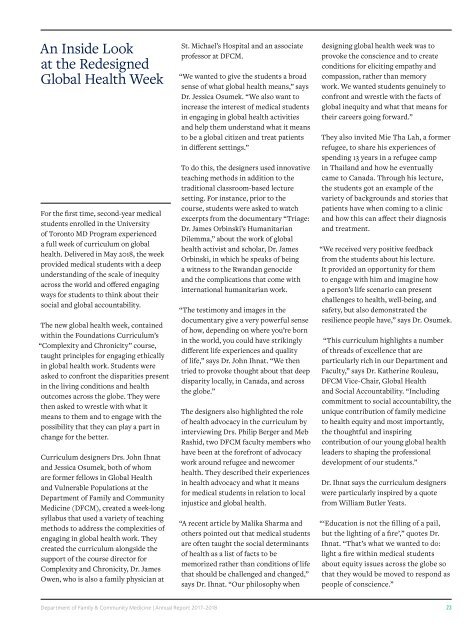DFCM Annual Report 2017-2018
You also want an ePaper? Increase the reach of your titles
YUMPU automatically turns print PDFs into web optimized ePapers that Google loves.
An Inside Look<br />
at the Redesigned<br />
Global Health Week<br />
For the first time, second-year medical<br />
students enrolled in the University<br />
of Toronto MD Program experienced<br />
a full week of curriculum on global<br />
health. Delivered in May <strong>2018</strong>, the week<br />
provided medical students with a deep<br />
understanding of the scale of inequity<br />
across the world and offered engaging<br />
ways for students to think about their<br />
social and global accountability.<br />
The new global health week, contained<br />
within the Foundations Curriculum’s<br />
“Complexity and Chronicity” course,<br />
taught principles for engaging ethically<br />
in global health work. Students were<br />
asked to confront the disparities present<br />
in the living conditions and health<br />
outcomes across the globe. They were<br />
then asked to wrestle with what it<br />
means to them and to engage with the<br />
possibility that they can play a part in<br />
change for the better.<br />
Curriculum designers Drs. John Ihnat<br />
and Jessica Osumek, both of whom<br />
are former fellows in Global Health<br />
and Vulnerable Populations at the<br />
Department of Family and Community<br />
Medicine (<strong>DFCM</strong>), created a week-long<br />
syllabus that used a variety of teaching<br />
methods to address the complexities of<br />
engaging in global health work. They<br />
created the curriculum alongside the<br />
support of the course director for<br />
Complexity and Chronicity, Dr. James<br />
Owen, who is also a family physician at<br />
St. Michael’s Hospital and an associate<br />
professor at <strong>DFCM</strong>.<br />
“We wanted to give the students a broad<br />
sense of what global health means,” says<br />
Dr. Jessica Osumek. “We also want to<br />
increase the interest of medical students<br />
in engaging in global health activities<br />
and help them understand what it means<br />
to be a global citizen and treat patients<br />
in different settings.”<br />
To do this, the designers used innovative<br />
teaching methods in addition to the<br />
traditional classroom-based lecture<br />
setting. For instance, prior to the<br />
course, students were asked to watch<br />
excerpts from the documentary “Triage:<br />
Dr. James Orbinski’s Humanitarian<br />
Dilemma,” about the work of global<br />
health activist and scholar, Dr. James<br />
Orbinski, in which he speaks of being<br />
a witness to the Rwandan genocide<br />
and the complications that come with<br />
international humanitarian work.<br />
“The testimony and images in the<br />
documentary give a very powerful sense<br />
of how, depending on where you’re born<br />
in the world, you could have strikingly<br />
different life experiences and quality<br />
of life,” says Dr. John Ihnat. “We then<br />
tried to provoke thought about that deep<br />
disparity locally, in Canada, and across<br />
the globe.”<br />
The designers also highlighted the role<br />
of health advocacy in the curriculum by<br />
interviewing Drs. Philip Berger and Meb<br />
Rashid, two <strong>DFCM</strong> faculty members who<br />
have been at the forefront of advocacy<br />
work around refugee and newcomer<br />
health. They described their experiences<br />
in health advocacy and what it means<br />
for medical students in relation to local<br />
injustice and global health.<br />
“A recent article by Malika Sharma and<br />
others pointed out that medical students<br />
are often taught the social determinants<br />
of health as a list of facts to be<br />
memorized rather than conditions of life<br />
that should be challenged and changed,”<br />
says Dr. Ihnat. “Our philosophy when<br />
designing global health week was to<br />
provoke the conscience and to create<br />
conditions for eliciting empathy and<br />
compassion, rather than memory<br />
work. We wanted students genuinely to<br />
confront and wrestle with the facts of<br />
global inequity and what that means for<br />
their careers going forward.”<br />
They also invited Mie Tha Lah, a former<br />
refugee, to share his experiences of<br />
spending 13 years in a refugee camp<br />
in Thailand and how he eventually<br />
came to Canada. Through his lecture,<br />
the students got an example of the<br />
variety of backgrounds and stories that<br />
patients have when coming to a clinic<br />
and how this can affect their diagnosis<br />
and treatment.<br />
“We received very positive feedback<br />
from the students about his lecture.<br />
It provided an opportunity for them<br />
to engage with him and imagine how<br />
a person’s life scenario can present<br />
challenges to health, well-being, and<br />
safety, but also demonstrated the<br />
resilience people have,” says Dr. Osumek.<br />
“This curriculum highlights a number<br />
of threads of excellence that are<br />
particularly rich in our Department and<br />
Faculty,” says Dr. Katherine Rouleau,<br />
<strong>DFCM</strong> Vice-Chair, Global Health<br />
and Social Accountability. “Including<br />
commitment to social accountability, the<br />
unique contribution of family medicine<br />
to health equity and most importantly,<br />
the thoughtful and inspiring<br />
contribution of our young global health<br />
leaders to shaping the professional<br />
development of our students.”<br />
Dr. Ihnat says the curriculum designers<br />
were particularly inspired by a quote<br />
from William Butler Yeats.<br />
“‘Education is not the filling of a pail,<br />
but the lighting of a fire’,” quotes Dr.<br />
Ihnat. “That’s what we wanted to do:<br />
light a fire within medical students<br />
about equity issues across the globe so<br />
that they would be moved to respond as<br />
people of conscience.”<br />
Department of Family & Community Medicine | <strong>Annual</strong> <strong>Report</strong> <strong>2017</strong>–<strong>2018</strong> 23


